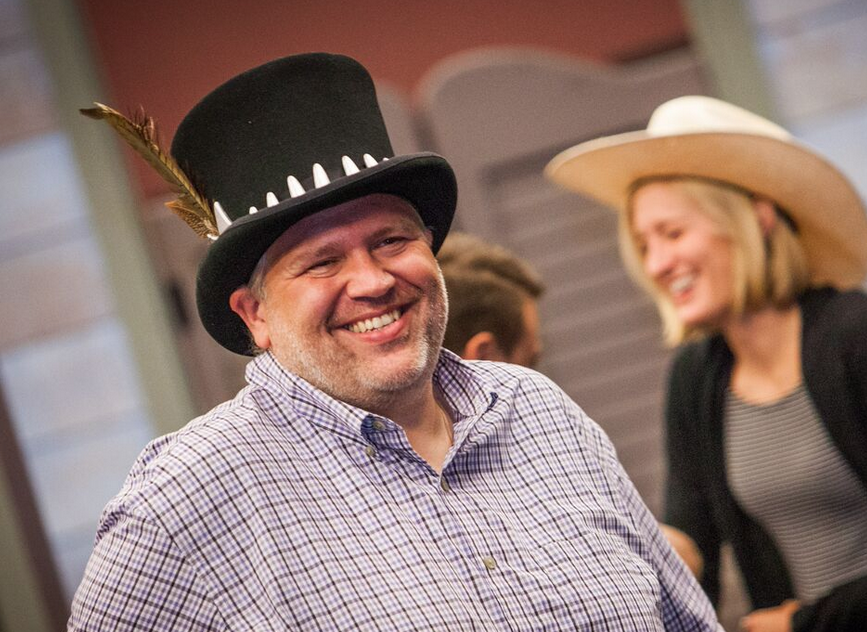Behind the Scenes with the Funny Man of the Portland Opera

Stephen Condy in rehearsals for Portland Opera's The Elixir of Love. Photo by Jonathan Ley
Dramatic? Sure. Tear-jerking? Probably. But funny? That may not be the adjective at the forefront of your mind when you think of opera. Yet there are countless roles in countless comedies that make a strong case for the opera funnies. Stephen Condy, Portland Opera’s longstanding “buffo”—who plays a snake-oil salesman in the upcoming production of The Elixir of Love—talked to us ahead of Friday's opening night about playing the funnyman.
The opera is not something normally associated with belly laughs. Do we need to rethink that impression?
Opera does have a stereotyped reputation—the idea that somebody always dies at the end. But comedy in opera has ben around since the late 17th century. Of the top five most popular operas now, three of them are comedies. So I think we get very stuck into the stereotypes and the spears, the Viking helmets and shields and women singing with breastplates, and we forget that there’s actually a wider range of stories.
So what’s so funny about The Elixir of Love?
The comedy comes in the story of this traveling salesman that comes to town. He’s the equivalent of the snake oil salesman, and in our production, which is set in the wild West, he literally is the snake oil salesman. The humor comes in the text, in how the people of the town really buy into this. And it comes in how they react to this ‘Elixir of Love’ he peddles, which is nothing more than a cheap Bordeaux wine. The hero Nemorino thinks it’s working on him when he’s just getting drunk. It’s situation comedy and we play it to get the laugh. There are some very poignant and touching moments in The Elixir of Love and very real characters, which I think makes the tragedy much more poignant, and the comedy much more funny.
Does the language barrier at the opera provide a challenge to comic timing?
The thing that has changed for the opera world, and has made it much more accessible, is the institution of the supertitle translations. And with the theatrical portion of it, even if you’re not watching the text, you’re able as an actor to tell a story without someone necessarily understanding the words. In a serious opera—the stereotypical Wagner opera—they’re saying something very serious, very long, and they’re standing in one place singing at someone, and you’ve no idea what they’re doing because they’re not moving. But when we’re doing a comedy we’ve a lot more license to move around—there’s the theatrical element. There’s also the musical element: Donizetti, who wrote The Elixir of Love, wrote music that expressed the emotion, so when it’s serious there’s a pretty melody and it’s slow, and when there’s a lot of comedy going on, the music is bubbly, it’s light.
"Bugs Bunny was my first introduction to opera."
The Italian comic operas often employ the “bassa buffo” character, who is usually at the center of the comic action. You’ve often played these roles—what’s their appeal?
That’s just the personality that I’ve been given. I was always the funny guy. As a singer, we’re always trying to sing beautifully, and touch people’s hearts and sing in the operatic tradition, and there was a very serious aria we were singing in a performance situation once, and while I was singing there were people giggling in the audience. And I wasn’t trying to be funny! At that moment I realized ‘I think my strength is more in being funny.’
This particular category, the “buffo” style”, is known for patter, so you have to be able to sing very fast, a lot of different words have to fly off the tongue. That’s part of the skill I was able to develop.
Do you have any comic inspirations outside of the opera?
I grew up on the Warner Brothers cartoons, so like many people Bugs Bunny was my first introduction to opera. ‘What’s Opera Doc?’ and ‘The Rabbit of Seville’, the cartoon comedies, with things that you can’t do in real life. Like when Wiley Coyote steps off the cliff and doesn’t fall for thirty seconds—those kinds of things. Today there are a lot of good comedians. Like Seinfeld, a story about nothing which is the humor that I have always gravitated towards.
Does it ever fall flat?
Absolutely! It depends on the night, it depends on the audience. What you don’t want to do is try to overplay it, or try too hard to be funny. When someone is trying to be funny it’s very awkward and nobody laughs. Then it becomes tragedy, and there’s the line between comedy and tragedy.
Portland Opera's The Elixir of Love opens on July 17 at the Newmark Theatre, and runs through August 1.
More information here.




